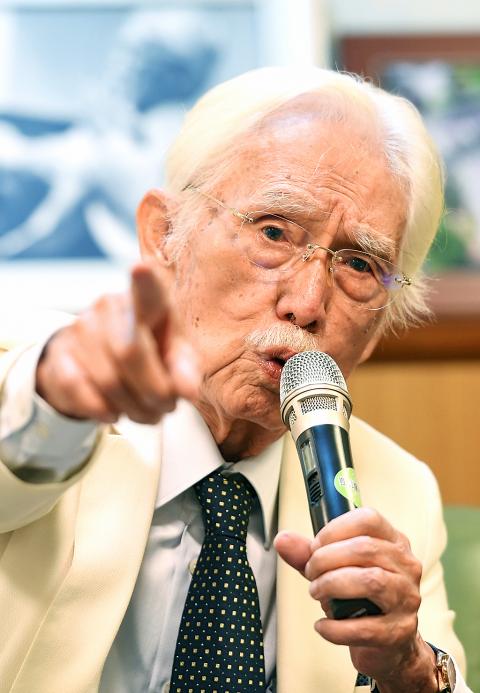Presidential adviser Koo Kwang-ming (辜寬敏) yesterday urged the government to normalize the nation by seeking international recognition as “Taiwan” instead of as the Republic of China (ROC), after Panama switched diplomatic recognition from Taipei to Beijing on Tuesday.
Following the diplomatic debacle, the long-time independence advocate said that Panama’s decision did not come as a surprise as the number of Taiwan’s diplomatic allies has continuously dropped since the ROC was expelled from the UN.
The diplomatic switch is part of a “trend that cannot be reversed” and Taiwan should be prepared for a further decrease in the number of its allies, he said.

Photo: Liu Hsin-de, Taipei Times
However, the decrease in the ROC’s diplomatic allies could increase the space for Taiwan as “an independent state” unassociated with the ROC, he said.
Koo urged the government to abandon the ROC framework and draft a new constitution — to be approved by a referendum — and seek formal UN membership and international recognition with a new state identity.
“Only 20 countries — whose populations are smaller than Taiwan’s — in the world recognize the ROC. What is the meaning of their recognition of the ROC?” Koo said.
Praising President Tsai Ing-wen (蔡英文) for adopting a tougher tone with China when she announced Panama’s diplomatic switch, Koo said it was “the first time she took a hard line” on Beijing’s attempt to suppress Taipei in the international arena, which was a “major change of attitude” in Tsai’s dealings with China.
However, Tsai should not direct her attention only on Beijing, but also toward the Taiwanese public and make Taiwan’s “normalization” her top priority, he said.
Koo opposes Tsai’s China policy of maintaining the “status quo” in cross-strait relations, and has called for increased efforts to make Taiwan a “normal” and independent nation.
“There should be no more talks about maintaining the ‘status quo.’ Action should be taken to deal with our basic problems,” such as renaming the ROC “Taiwan” or drafting a new constitution, Koo said.
Prior to World War II, the only independent countries in east Asia were China, Japan and Thailand, but “70 years later, what Asian country still does not have a proper identity? Only Taiwan,” he said.
About one month ago, he suggested to Tsai that she should reorient cross-strait relations as “brother nations,” but Tsai only said priority should be given to “Taiwan’s admission to the UN,” Koo said.
Beijing is also re-evaluating its Taiwan policy because it has realized its hardline policy has created antagonism in Taiwan, Koo said.

Auckland rang in 2026 with a downtown fireworks display launched from New Zealand’s tallest structure, Sky Tower, making it the first major city to greet the new year at a celebration dampened by rain, while crowds in Taipei braved the elements to watch Taipei 101’s display. South Pacific countries are the first to bid farewell to 2025. Clocks struck midnight in Auckland, with a population of 1.7 million, 18 hours before the famous ball was to drop in New York’s Times Square. The five-minute display involved 3,500 fireworks launched from the 240m Sky Tower. Smaller community events were canceled across New Zealand’s

The Ministry of Foreign Affairs (MOFA) yesterday said it is closely monitoring developments in Venezuela, and would continue to cooperate with democratic allies and work together for regional and global security, stability, and prosperity. The remarks came after the US on Saturday launched a series of airstrikes in Venezuela and kidnapped Venezuelan President Nicolas Maduro, who was later flown to New York along with his wife. The pair face US charges related to drug trafficking and alleged cooperation with gangs designated as terrorist organizations. Maduro has denied the allegations. The ministry said that it is closely monitoring the political and economic situation

‘SLICING METHOD’: In the event of a blockade, the China Coast Guard would intercept Taiwanese ships while its navy would seek to deter foreign intervention China’s military drills around Taiwan this week signaled potential strategies to cut the nation off from energy supplies and foreign military assistance, a US think tank report said. The Chinese People’s Liberation Army (PLA) conducted what it called “Justice Mission 2025” exercises from Monday to Tuesday in five maritime zones and airspace around Taiwan, calling them a warning to “Taiwanese independence” forces. In a report released on Wednesday, the Institute for the Study of War said the exercises effectively simulated blocking shipping routes to major port cities, including Kaohsiung, Keelung and Hualien. Taiwan would be highly vulnerable under such a blockade, because it

UNRELENTING: China attempted cyberattacks on Taiwan’s critical infrastructure 2.63 million times per day last year, up from 1.23 million in 2023, the NSB said China’s cyberarmy has long engaged in cyberattacks against Taiwan’s critical infrastructure, employing diverse and evolving tactics, the National Security Bureau (NSB) said yesterday, adding that cyberattacks on critical energy infrastructure last year increased 10-fold compared with the previous year. The NSB yesterday released a report titled Analysis on China’s Cyber Threats to Taiwan’s Critical Infrastructure in 2025, outlining the number of cyberattacks, major tactics and hacker groups. Taiwan’s national intelligence community identified a large number of cybersecurity incidents last year, the bureau said in a statement. China’s cyberarmy last year launched an average of 2.63 million intrusion attempts per day targeting Taiwan’s critical